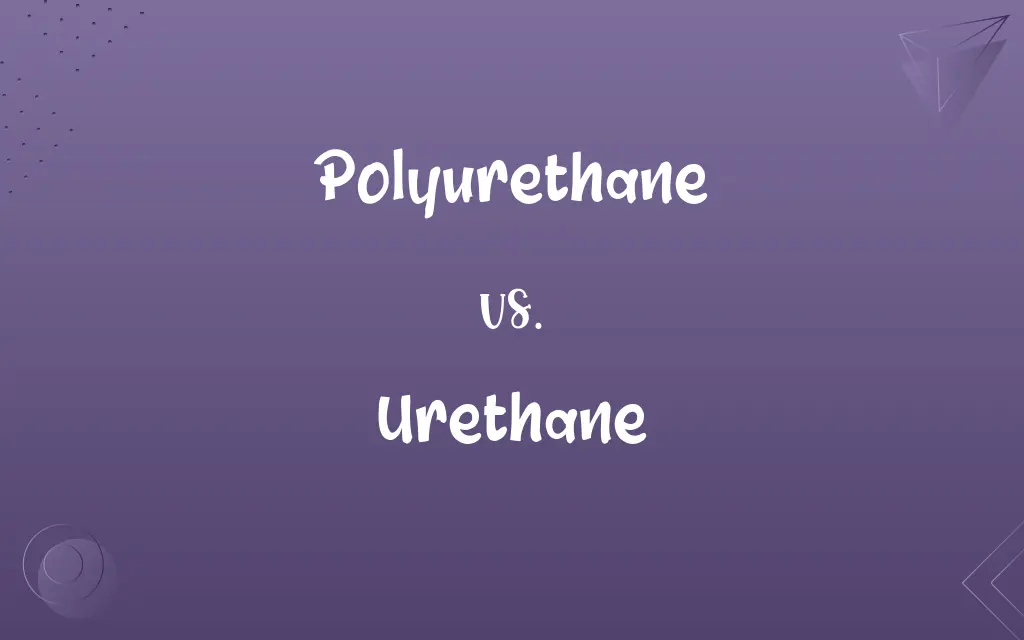Polyurethane vs. Urethane: Know the Difference

By Shumaila Saeed & Hifza Nasir || Published on March 7, 2024
Polyurethane, versatile polymer used in various applications from foam to finishes, Urethane often used interchangeably with polyurethane in casual contexts, technically refers to specific chemical compound but is less commonly used in terminology.

Key Differences
Polyurethane is a synthetic resin known for its exceptional durability, flexibility, and resistance to abrasion, water, and chemicals. It is widely used in making everything from automotive parts and insulation materials to wood finishes and footwear. The versatility of polyurethane comes from its ability to be formulated as rigid or flexible foams, elastomers, and coatings, adapting to the needs of various industries.
Shumaila Saeed
Mar 07, 2024
Urethane, in the strict chemical sense, refers to ethyl carbamate, a compound with limited practical applications compared to the broad utility of polyurethanes. However, the term "urethane" is often colloquially used to describe products made from polyurethane, leading to some confusion. In industry and commercial settings, when someone mentions urethane in the context of finishes, foams, or elastomers, they are typically referring to a type of polyurethane.
Hifza Nasir
Mar 07, 2024
Polyurethane products are tailored to specific applications by adjusting the chemical formula, which can change the material's characteristics, such as hardness, density, and elasticity. This adaptability makes polyurethane a preferred material for a wide range of applications, including protective coatings, seals, gaskets, and structural components.
Hifza Nasir
Mar 07, 2024
The use of the term "urethane" without specifying "polyurethane" is less common in technical discussions. It is important for professionals and consumers alike to understand that the broad array of applications and products usually attributed to urethane actually falls under the category of polyurethane materials.
Shumaila Saeed
Mar 07, 2024
Choosing between polyurethane formulations involves considering the specific requirements of the application, such as the desired durability, flexibility, and environmental resistance. The misnomer of using "urethane" for "polyurethane" does not impact the inherent qualities of the material but can influence clarity in communication, especially in technical or industrial contexts.
Shumaila Saeed
Mar 07, 2024
ADVERTISEMENT
Comparison Chart
Chemical Structure
Polymers with urethane linkages
A specific organic compound (ethyl carbamate)
Hifza Nasir
Mar 07, 2024
Applications
Automotive parts, foams, finishes, adhesives
Limited practical applications
Shumaila Saeed
Mar 07, 2024
Flexibility & Durability
Highly adaptable, can be formulated for specific needs
Not applicable to the broader uses associated with polyurethanes
Shumaila Saeed
Mar 07, 2024
Common Usage
Broadly used in various industries
Less commonly used; often a misnomer for polyurethane
Hifza Nasir
Mar 07, 2024
Polyurethane and Urethane Definitions
Polyurethane
Versatile Polymer.
Polyurethane foam is extensively used in upholstery and insulation for its flexibility and thermal properties.
Hifza Nasir
Feb 25, 2024
ADVERTISEMENT
Urethane
Misnomer for Polyurethane.
The term urethane is often incorrectly used to describe polyurethane products.
Shumaila Saeed
Feb 25, 2024
Polyurethane
Flexible Elastomers.
Polyurethane elastomers are used in making durable tires and industrial belts due to their abrasion resistance.
Hifza Nasir
Feb 25, 2024
Urethane
Chemical Compound.
Urethane is a specific organic compound with limited use in industrial applications.
Hifza Nasir
Feb 25, 2024
Polyurethane
Durable Coatings.
Polyurethane coatings protect wood floors and automotive paints from scratches and environmental damage.
Shumaila Saeed
Feb 25, 2024
Urethane
Any of several esters, other than the ethyl ester, of carbamic acid.
Shumaila Saeed
Feb 24, 2024
ADVERTISEMENT
Polyurethane
Chemical Resistance.
Polyurethane seals are preferred in machinery for their resistance to oil and other chemicals.
Hifza Nasir
Feb 25, 2024
Polyurethane
Adhesive Properties.
Polyurethane adhesives offer strong bonding for woodworking and construction applications.
Shumaila Saeed
Feb 25, 2024
Polyurethane
Any of various thermoplastic isocyanate polymers, widely varying in flexibility, used in tough chemical-resistant coatings, adhesives, and foams.
Shumaila Saeed
Feb 24, 2024
Polyurethane
(organic chemistry) Any of various polymeric resins containing urethane links; used in very many industrial and domestic applications.
Shumaila Saeed
Feb 24, 2024
Polyurethane
Any of various polymers containing the urethane radical; a wide variety of synthetic forms are made and used as adhesives or plastics or paints or rubber
Shumaila Saeed
Feb 24, 2024
Repeatedly Asked Queries
How do I choose the right type of polyurethane for a project?
Consider the application's requirements for durability, flexibility, and resistance to chemicals or weather.
Hifza Nasir
Mar 07, 2024
What are the environmental considerations for using polyurethane?
Polyurethane production and disposal can impact the environment; seeking eco-friendly formulations and recycling where possible is advisable.
Shumaila Saeed
Mar 07, 2024
What advancements have been made in polyurethane technology?
Ongoing research has led to more sustainable, water-based, and lower-VOC polyurethane formulations.
Hifza Nasir
Mar 07, 2024
Can urethane be used interchangeably with polyurethane?
In casual conversation, yes, but technically they are different, with "urethane" often incorrectly used to refer to polyurethane-based products.
Shumaila Saeed
Mar 07, 2024
Can polyurethane be repaired or refinished?
Yes, polyurethane coatings and finishes can be sanded and reapplied, extending the life of the treated surfaces.
Shumaila Saeed
Mar 07, 2024
How does temperature affect polyurethane application?
Temperature can affect the curing time and final properties of polyurethane; manufacturers provide guidelines for optimal application conditions.
Shumaila Saeed
Mar 07, 2024
Why is polyurethane preferred in manufacturing?
Due to its versatility, durability, and resistance to environmental factors, making it suitable for a wide range of applications.
Shumaila Saeed
Mar 07, 2024
Can polyurethane be used outdoors?
Yes, but it's important to choose a formulation designed for outdoor use to ensure UV stability and weather resistance.
Hifza Nasir
Mar 07, 2024
Is polyurethane safe for all uses?
While safe for many applications, specific formulations may release volatile organic compounds (VOCs); ventilation and safety precautions are recommended during application.
Hifza Nasir
Mar 07, 2024
Are there non-toxic alternatives to polyurethane?
Yes, there are eco-friendly and less toxic alternatives, including water-based polyurethanes and natural oil finishes.
Shumaila Saeed
Mar 07, 2024
Share this page
Link for your blog / website
HTML
Link to share via messenger
About Author
Written by
Shumaila SaeedShumaila Saeed, an expert content creator with 6 years of experience, specializes in distilling complex topics into easily digestible comparisons, shining a light on the nuances that both inform and educate readers with clarity and accuracy.
Co-written by
Hifza Nasir







































































